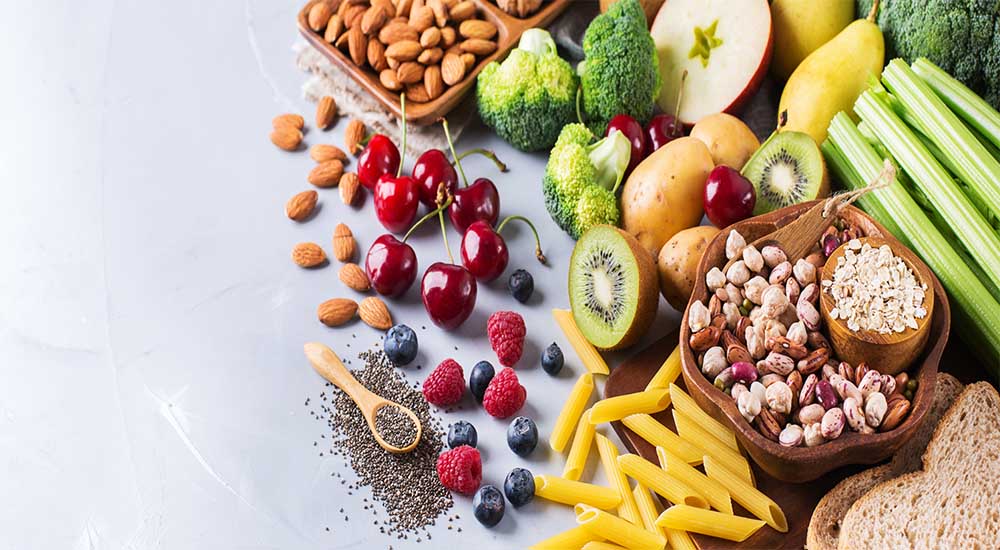Why Fiber Can Save Your Life

How Fiber Defends You from Disease
We hear a lot about fiber:
- “Fiber is good for you.”
- “Eat enough fiber every day.”
- “This cereal/bread is fiber-enriched.”
It’s kind of like “eat your vegetables”; we’ve heard it a lot but is there a right and wrong way to get fiber? Yes.
How much fiber do you actually need? I’ll cover this below.
If something says “fiber-enriched” is it actually good for you? That answer is below as well.
And perhaps most importantly, exactly WHY is fiber so good for you?
As is true of most things when it comes to food and nutrition, all are not created equal, and what we now know about fiber and its importance in defending us against the leading degenerative diseases that are killing us, is well worth understanding.
Why is Fiber Healthy?
Fiber is anti-inflammatory, aids in the elimination of toxins, AND helps feed the good bacteria low down in your colon. Let’s not gloss over the anti-inflammatory aspect as that is the big reason a high fiber diet is associated with reducing the risk of heart disease, diabetes, cancer, bowel disease, and obesity.
How much fiber do I need?
That’s a great question. The minimum daily requirement (MDR) is about 32 grams per day, but much like most of the nutritional recommendations associated with the MDR, those of us in functional and Root Cause medicine feel this is too low. Why is it insufficient?
Paleolithic man likely consumed about 100 grams of fiber per day.
Areas of rural Africa, where heart disease and colon disease (such as diverticular disease) were all but unheard of, ate 70-90 grams of fiber per day.
What does Fiber DO Exactly?
We used to think fiber was indigestible and its biggest contribution was to bulk up the stool making elimination easier and more regular, in other words, it helped with constipation. It turns out fiber is quite digestible. Who eats it? Your gut bacteria (you have 100 trillion of them) eat the fiber and they make something called butyrate with it, a short-chain fatty acid.
Butyrate does a number of amazing things:
- Inhibits the growth of bad bacteria
- Maintains the structure and health of the lining of your gut. There’s only a single layer of cells making up the lining of your intestine – a single layer that needs to be kept healthy and strong with adequate levels of butyrate.
- Butyrate keeps the immune system strong, yet calm, not overreacting. Strong levels of butyrate signal the immune system that all is well, thereby suppressing inflammation. If butyrate levels drop due to insufficient fiber intake, your immune system ramps up and starts to attack good bacteria and bad alike. Now you understand fiber’s association with disease. Low fiber = low butyrate = degenerative disease. If the immune system starts attacking inappropriately you end up with problems like inflammatory bowel disease, heart disease, diabetes, obesity, and autoimmune disease.
- Improves the absorption of minerals such as calcium and magnesium.
What Type of Fiber is Best?
Is there a difference between eating “fiber-enriched” bread vs consuming fresh fruit or vegetable? You bet! In fact, there’s no comparison.
When food is naturally whole and contains fiber such as that found in fruits, vegetables, nuts, beans, seeds, and legumes, the fiber is wrapped up tight with substances called polyphenols, one of the groups of antioxidants. Polyphenols are known to protect your heart, reduce cancer risk, and our favorite – they’re anti-inflammatory.
This is why I frequently promote blending vs. juicing. When you juice you not only lose the fiber but what you’re drinking is less healthy due to the loss of the polyphenols bound to the fiber. The polyphenols feed our good bacteria which in turn allow us to make butyrate, as discussed above.
This is why eating whole fruits lower your risk of diabetes and decrease your cholesterol while eating fruit juice has the opposite, negative effect.
When cheap fiber made from the outer husk of the grain is added back to a food such as bread or cereal, the fiber is devoid of all nutrients – it is fiber, but with none of the added benefits seen in real, whole food plant-based fiber.
Do you have a favorite store-bought cereal or bread and you want to see if the fiber content is healthy? Here’s an easy formula:
Take the grams of carbohydrate divided by the grams of fiber – the number should be 5 or less. A popular white bread stacks up like this per slice: 12.65 grams of total carbohydrate and 0.6 grams of fiber. When you do the math it comes out to 21 – uh oh, that’s way over 5; put it back!
And, of course, remember if it’s cereal or bread it is no longer a whole food, therefore any fiber that’s added back in, instead of being there naturally is not the best. Opt for the whole food instead whenever possible.
Fiber Makes You Live Longer
The benefits of fiber are it provides nutrition for our good bacteria and they in turn produce butyrate for us. The result is improved heart health, cholesterol levels, reduced weight, normalized blood sugar, and blood pressure. Yes, proper fiber intake will increase your life expectancy by preventing the chronic diseases that shorten your life.
Do you need help with your health?
We have the diagnostic and testing tools, the clinical experience, and a different medical approach to discovering the root cause of why you have the symptoms that are bothering you. As long as you are ready to make some dietary and lifestyle changes, we can help you. We will "hold your hand" through the changes, step by step, to make each step an easy one. We are located in Clearwater, FL, at 1000 S Ft Harrison, at the corner of Ft. Harrison Ave. and Magnolia St. There is plenty of parking space directly accessible from Ft Harrison. If it is not convenient for you to come to Root Cause Medical Clinic, we offer telehealth/telemedicine consultations to residents of certain states. Call us for details.
Contact us for a Consultation – Call 727-335-0400

Dr. Vikki Petersen DC. CCN
Founder of Root Cause Medical Clinic
Certified Functional Medicine Practitioner
Dr Vikki Petersen is a public speaker, author of two books, several eBooks and creates cutting edge content for her YouTube community. Dr Vikki is committed to bringing Root Cause Medicine and its unique approach to restoring health naturally to the world.
Ask a Doctor
Have a health concern you'd like to speak with a doctor about? Or just want clarity on a subject? Ask Us!


